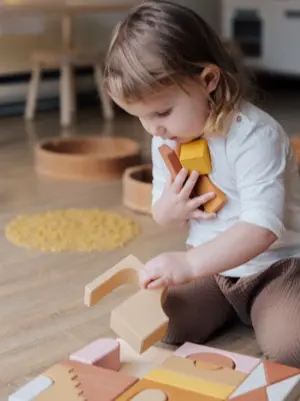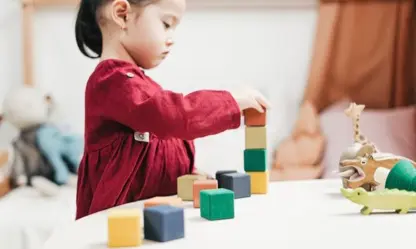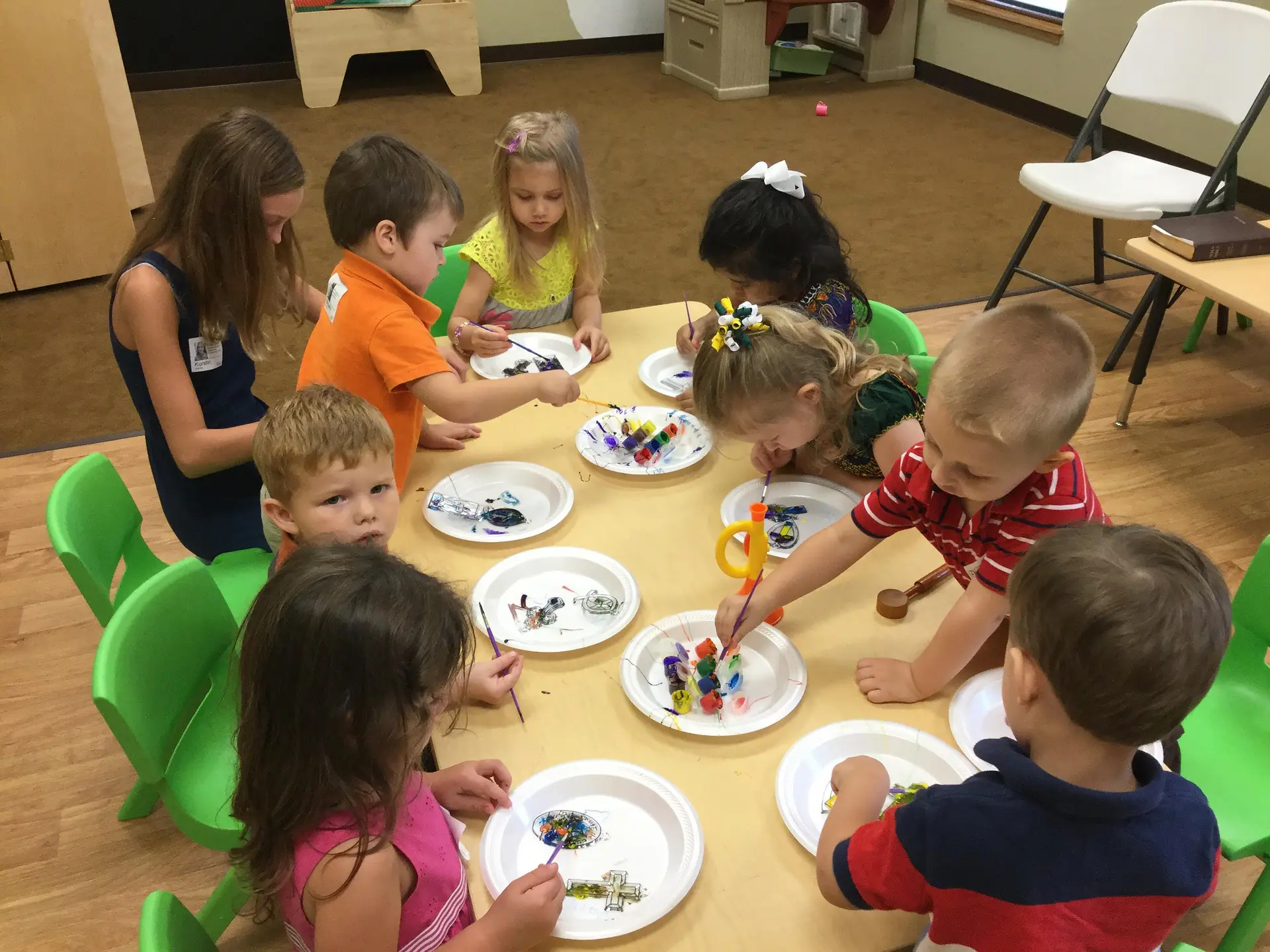Toddlers and Preschoolers Child Development
Children develop at their own pace, so it's impossible
to tell exactly when yours will learn a given skill. The
developmental milestones below will give you a general
idea of the changes you can expect as your child gets
older, but don't be alarmed if your child's development is not exactly as listed
.
Toddlers Child Development by age 24 month
(2 years old)

Social Skills
- Imitates behavior of others, especially adults and older children
- More aware of herself as separate from others
- More excited about company of other children
Emotional Development
- Demonstrates increasing independence
- Begins to show defiant behavior
- Separation anxiety increases toward midyear then fades
Cognitive Development
- Finds objects even when hidden under two or three covers
- Begins to sort by shapes and colors
- Begins make-believe play
Language skills
- Points to object or picture when it's named for him
- Recognizes names of familiar people, objects, and body parts
- Says several single words (by 15 to 18 months)
- Uses simple phrases (by 18 to 24 months)
- Uses 2- to 4-word sentences
- Follows simple instructions
- Repeats words overheard in conversation
Movement
- Walks alone
- Pulls toys behind her while walking
- Carries large toy or several toys while walking
- Begins to run
- Stands on tiptoe
- Kicks a ball
- Climbs onto and down from furniture unassisted
- Walks up and down stairs holding on to support
Hand and Finger Skills
- Scribbles on his or her own
- Turns over container to pour out contents
- Builds tower of four blocks or more
- Might use one hand more often than the other
Health Issues
Tell your child's doctor or nurse if your child displays any
of the following signs of possible developmental delay for
this age range.
- Cannot walk by 18 months
- Fails to develop a mature heel-toe walking pattern after several months of walking, or walks only on his toes
- Does not speak at least 15 words
- Does not use two-word sentences by age 2
- By 15 months, does not seem to know the function of common household objects (brush, telephone, bell, fork, spoon)
- Does not imitate actions or words by the end of this period
- Does not follow simple instructions by age 2
- Cannot push a wheeled toy by age 2
Child development by end of 36 months

Social
- Imitates adults and playmates
- Spontaneously shows affection for familiar playmates
- Can take turns in games
- Understands concept of "mine" and "his/hers"
Emotional
- Shows affection openly
- Shows a wide range of emotions
- By 3, separates easily from parents
- Objects to major changes in routine
Cognitive
- Makes mechanical toys work
- Matches an object in her hand or room to a picture in a book
- Plays make-believe with dolls, animals, and people
- Sorts objects by shape and color
- Completes puzzles with three or four pieces
- Understands concept of "two"
Language
- Follows a two- or three-part command
- Recognizes and identifies almost all common objects and pictures
- Understands most sentences
- Understands placement in space ("on," "in," "under")
- Uses 4- to 5-word sentences
- Can say name, age, and sex
- Uses pronouns (I, you, me, we, they) and some plurals (cars, dogs, cats)
- Strangers can understand most of her words
Movement
- Climbs well
- Walks up and down stairs, alternating feet (one foot per stair step)
- Kicks ball
- Runs easily
- Pedals tricycle
- Bends over easily without falling
Hand and Finger Skills
- Makes up-and-down, side-to-side, and circular lines with pencil or crayon
- Turns book pages one at a time
- Builds a tower of more than six blocks
- Holds a pencil in writing position
- Screws and unscrews jar lids, nuts, and bolts
- Turns rotating handles
Developmental Health Watch
Alert your child's doctor or nurse if your child displays any
of the following signs of possible developmental delay for
this age range.
- Frequent falling and difficulty with stairs
- Persistent drooling or very unclear speech
- Cannot build a tower of more than four blocks
- Difficulty manipulating small objects
- Cannot copy a circle by age 3
- Cannot communicate in short phrases
- No involvement in "pretend" play
- Does not understand simple instructions
- Little interest in other children
- Extreme difficulty separating from mother or primary caregiver
- Poor eye contact
- Limited interest in toys
Child Development by the end of 4 years (48 months)

Social
- Interested in new experiences
- Cooperates with other children
- Plays "Mom" or "Dad"
- Increasingly inventive in fantasy play
- Dresses and undresses
- Negotiates solutions to conflicts
- More independent
Emotional
- Imagines that many unfamiliar images may be "monsters"
- Views self as a whole person involving body, mind, and feelings
- Often cannot tell the difference between fantasy and reality
Cognitive
- Correctly names some colors
- Understands the concept of counting and may know a few numbers
- Tries to solve problems from a single point of view
- Begins to have a clearer sense of time
- Follows three-part commands
- Recalls parts of a story
- Understands the concepts of "same" and "different"
- Engages in fantasy play
Language
- Has mastered some basic rules of grammar
- Speaks in sentences of five to six words
- Speaks clearly enough for strangers to understand
- Tells stories
Movement
- Hops and stands on one foot up to five seconds
- Goes upstairs and downstairs without support
- Kicks ball forward
- Throws ball overhand
- Catches bounced ball most of the time
- Moves forward and backward with agility
Hand and Finger Skills
- Copies square shapes
- Draws a person with two to four body parts
- Uses scissors
- Draws circles and squares
- Begins to copy some capital letters
Developmental Health Watch
Alert your child's doctor or nurse if your child displays any
of the following signs of possible developmental delay for
this age range.
- Cannot throw a ball overhand
- Cannot jump in place
- Cannot ride a tricycle
- Cannot grasp a crayon between thumb and fingers
- Has difficulty scribbling
- Cannot stack four blocks
- Still clings or cries whenever parents leave
- Shows no interest in interactive games
- Ignores other children
- Doesn't respond to people outside the family
- Doesn't engage in fantasy play
- Resists dressing, sleeping, using the toilet
- Lashes out without any self-control when angry or upset
- Cannot copy a circle
- Doesn't use sentences of more than three words
- Doesn't use "me" and "you" correctly